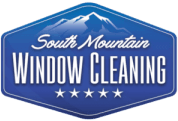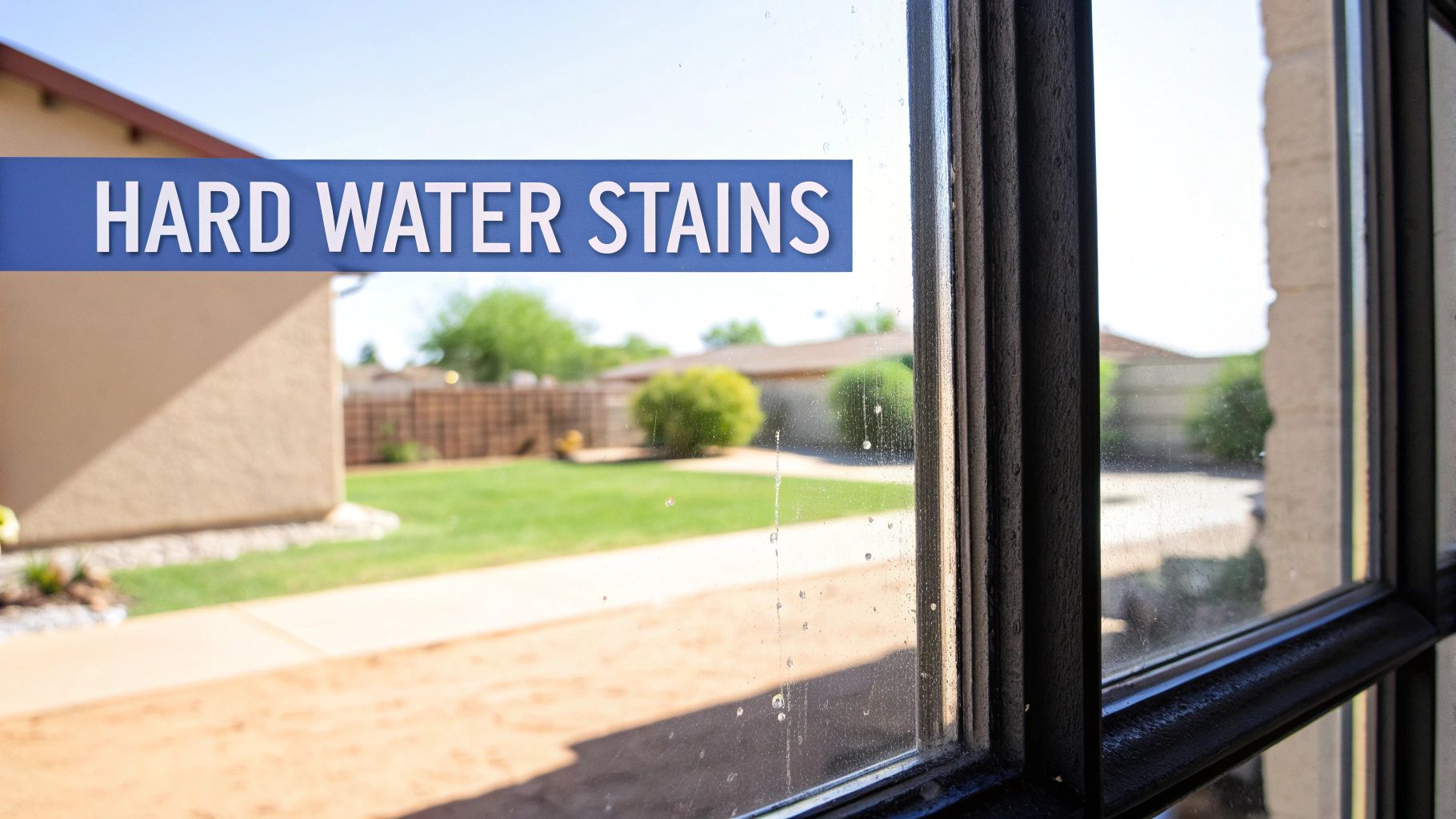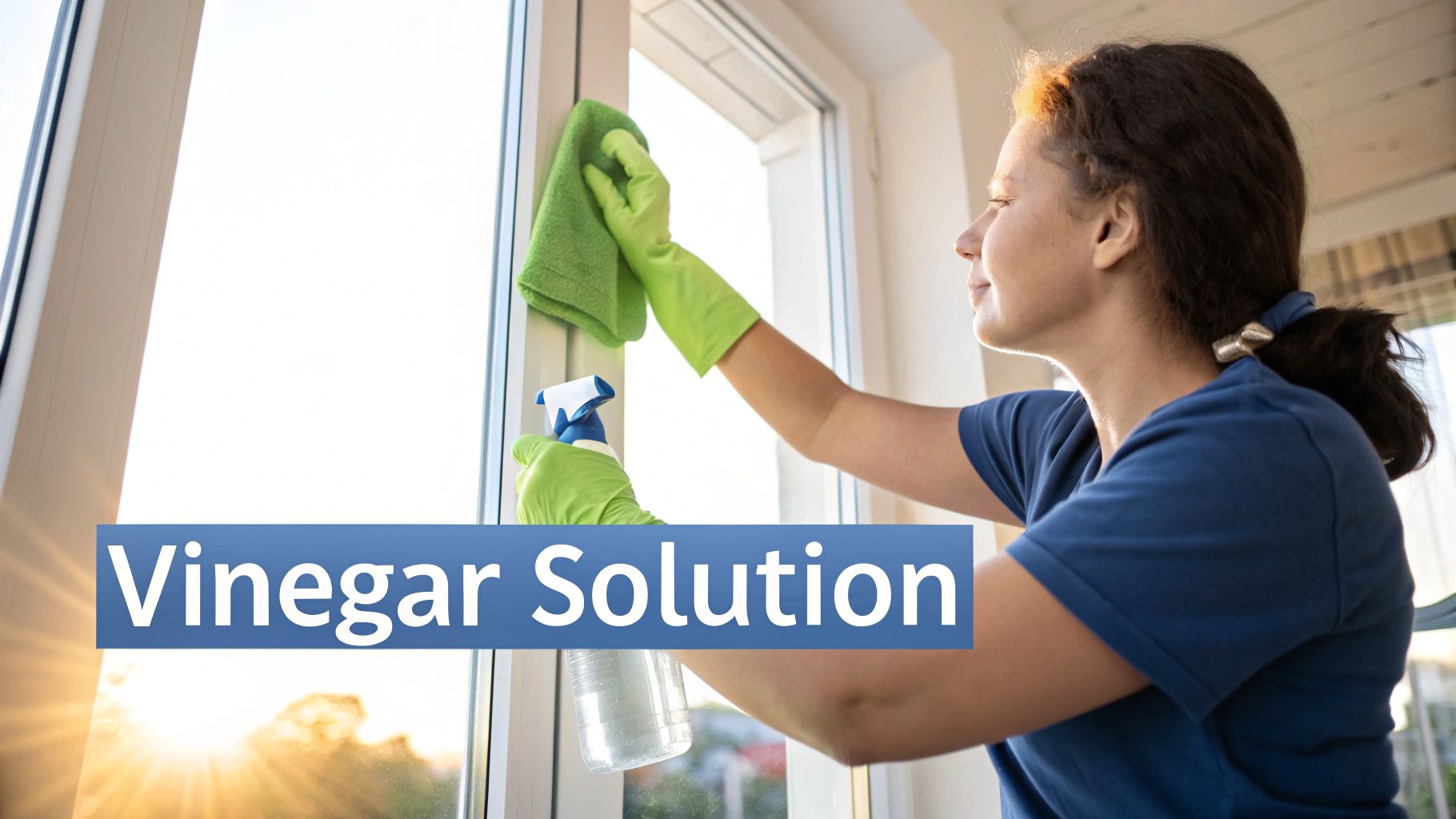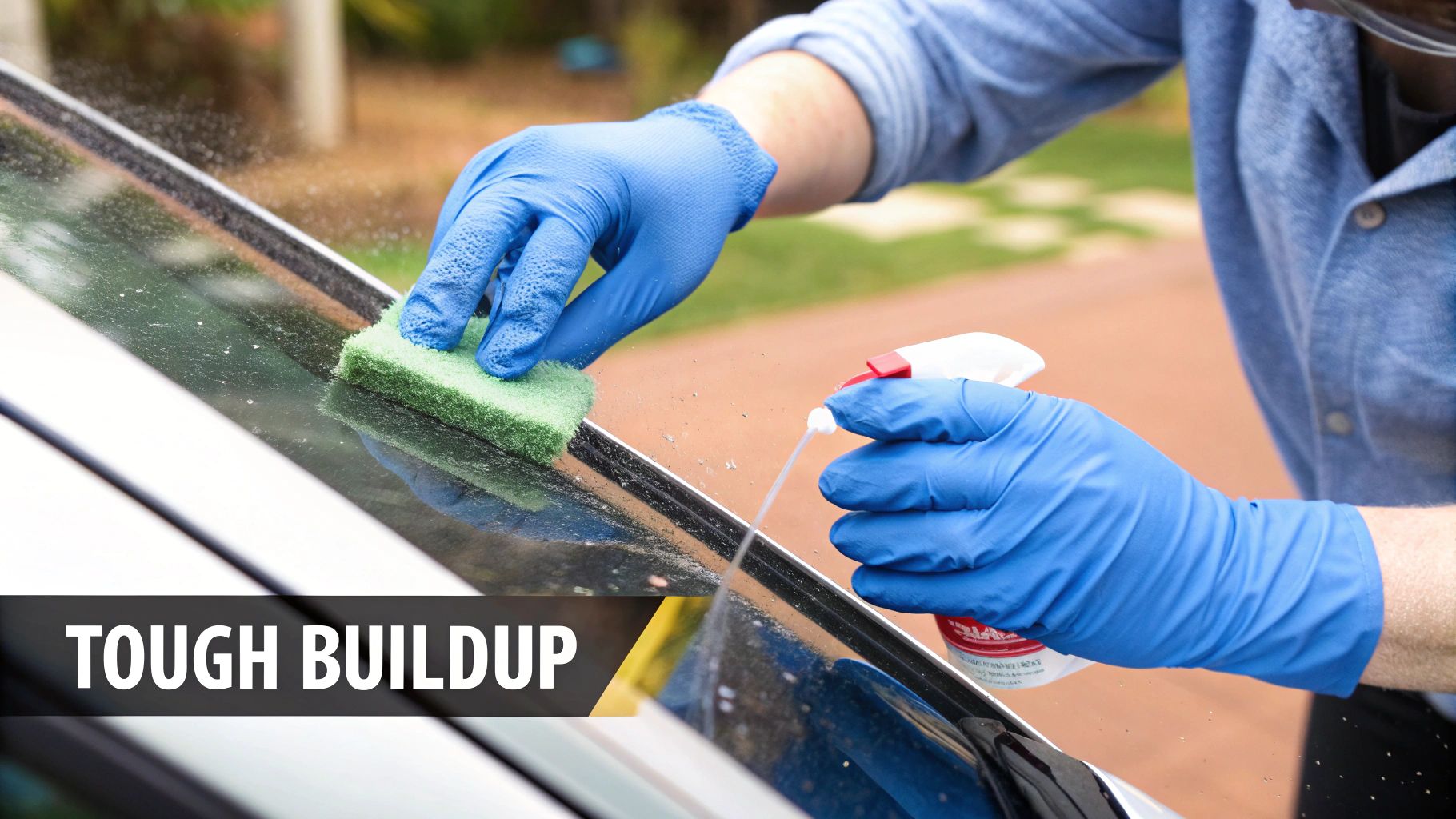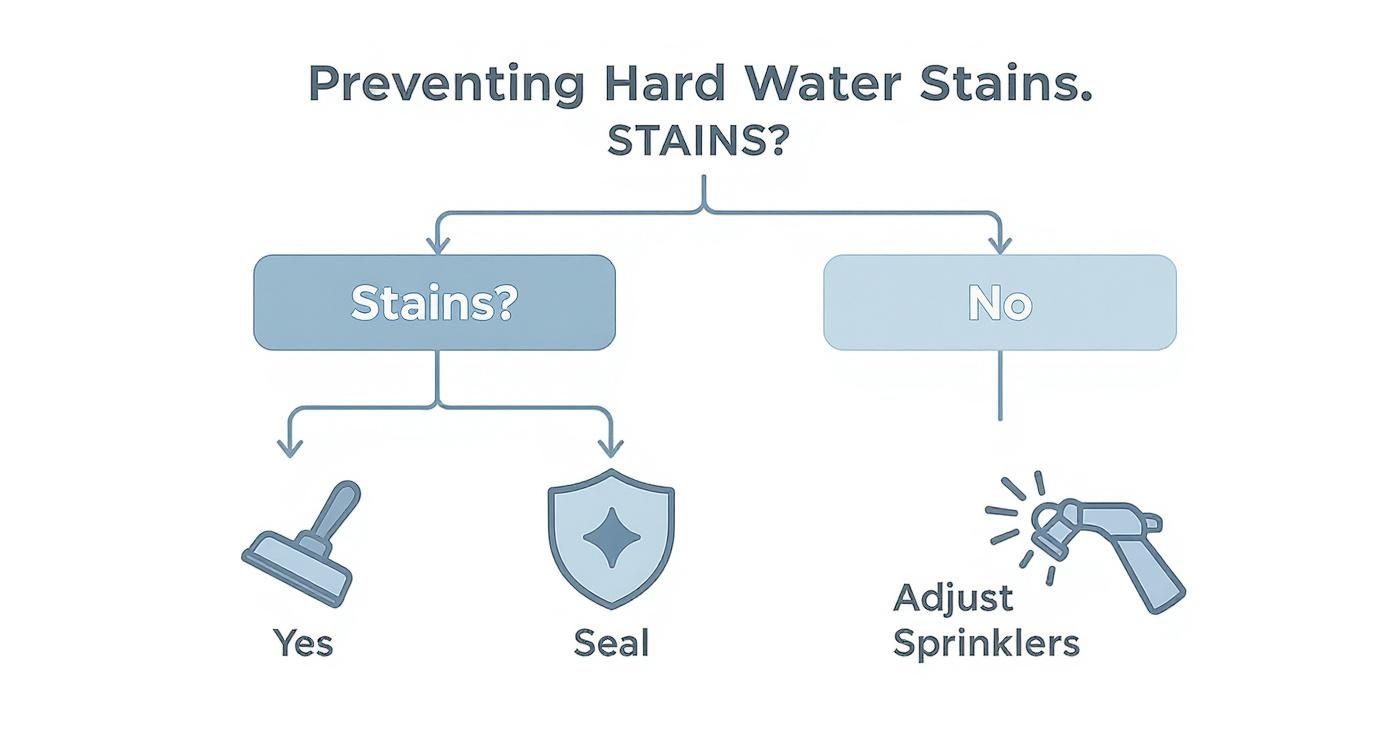To get rid of hard water stains on your windows, you need something acidic, like vinegar, to cut through the mineral deposits that have basically glued themselves to the glass. For the really tough, baked-on stains common in Arizona, you might need to bring out the big guns—a specialized commercial cleaner or even some gentle scrubbing—to break down the buildup without scratching the window.
The trick is patience. You have to let whatever cleaning solution you're using sit on the stain for a bit to give it time to work its magic and dissolve those mineral bonds. At South Mountain Window Cleaning, we've perfected this process for homes across Phoenix, Scottsdale, and Paradise Valley.
What Causes Stubborn Hard Water Stains on Windows
Before you start battling those annoying white spots, it really helps to know what you’re up against. Here in places like Phoenix, Scottsdale, and Tempe, our tap water is loaded with minerals. So, what you're seeing isn't just dirt; it's a chemical reaction playing out right on your glass.
When water from a sprinkler, a hose, or even pool splashes hits your windows, the intense Arizona sun makes it disappear in a flash. But it doesn't take everything with it. What gets left behind is that chalky, white gunk. That residue is a collection of mineral deposits, mostly calcium and magnesium, which are the two main culprits that make water "hard."
The Science Behind the Stains
These minerals do more than just sit on the glass; they actually start to bond with it. Think of it this way: glass looks smooth, but it’s actually porous. Over time, hard water deposits of minerals like calcium and magnesium settle into those pores. This is why getting them off is so tough—the minerals bond so tightly that your average spray-and-wipe with a simple water and vinegar mix often won't touch older, more established stains. You can find more professional insights on the difficulty of removing hard water stains on WindowGenie.com.
This bonding process is the reason a quick wipe-down with a wet rag does next to nothing. You might smear the mess around, but the minerals themselves are still stuck fast. It’s a frustrating cycle that leaves your windows looking dirty almost as soon as you've finished cleaning them.
Key Takeaway: Hard water stains aren't just on the surface. They are mineral deposits that chemically bond with the glass itself, and you need a specific game plan to either dissolve them or physically break them down.
If you let this go on for too long, it can cause bigger problems. The longer those minerals sit on the glass, the more they can etch into the surface, creating tiny, microscopic pits. This kind of damage, known as silicification, can leave your windows with a permanent cloudy look that no amount of cleaning will fix.
This is especially a problem here in the Valley, where the combination of high mineral content in the water and the relentless sun puts the whole process on fast-forward. Getting a handle on this is the first step in learning how to remove hard water stains from windows for good—and, more importantly, how to keep them from coming back. Your home's curb appeal is counting on it.
Effective DIY Methods for Lighter Stains
If you’ve caught the hard water spots early, you're in luck. For newer or less severe stains, you can often get fantastic results with a bit of elbow grease and some items you probably already have in your pantry. Before you even think about reaching for harsh chemicals, these gentle solutions are the perfect place to start.
The whole idea is to use the right technique to dissolve those stubborn mineral deposits without harming your glass. It’s a graded approach that even we pros at South Mountain Window Cleaning use. We'll always start with the mildest solution first, like a simple mix of 50/50 vinegar and warm water, before escalating to stronger methods if the stains refuse to budge. It's a common topic of discussion in professional forums, as you can see in threads like this one on WindowCleaner.com.
The Classic Vinegar and Water Solution
You can't go wrong with this classic. The natural acidity in white vinegar is perfect for breaking down the alkaline minerals—like calcium and magnesium—that create those chalky hard water stains. When mixed with water, it becomes a safe and surprisingly powerful cleaning agent.
Here’s the method that delivers the best results:
- Mix your solution: Grab a clean spray bottle and combine equal parts distilled white vinegar and warm water. Using warm water helps the vinegar work a little more effectively.
- Saturate the glass: Spray the solution generously over the stained areas. Don't be shy here; you need the glass to be thoroughly wet so the vinegar can do its job.
- Let it dwell: This is the most crucial step. You have to let the solution sit on the glass for at least 10-15 minutes. This "dwell time" gives the acetic acid a chance to actually dissolve the mineral bonds.
- Gently agitate: Using a soft microfiber cloth or a non-abrasive sponge, gently scrub the area in small circles. This helps lift the now-loosened minerals off the surface.
- Rinse and dry: Finish by rinsing the window with clean water and drying it completely with a quality squeegee for that perfect, streak-free finish. For more tips on squeegee work, check out our guide on the best way to clean windows.
DIY Hard Water Stain Removal Solutions
To make it even easier, here’s a quick rundown of common household solutions you can try.
| Solution | Mixture Ratio | Best For | Application Tip |
|---|---|---|---|
| Vinegar & Water | 1 part vinegar to 1 part warm water | Light, fresh mineral spots and general buildup | Let the solution dwell for 10-15 minutes before scrubbing. |
| Lemon Juice | Pure or diluted 50/50 with water | Mild stains; good alternative if you dislike the smell of vinegar | The citric acid works similarly to vinegar. Apply with a spray bottle or cloth. |
| Baking Soda Paste | Mix baking soda with a little water to form a paste | More stubborn individual spots that need gentle abrasion | Apply the paste directly to the stain, let it sit, then scrub gently with a damp cloth. |
| Club Soda | Use straight from the bottle | Very faint, new spots | The carbonation can help lift fresh mineral deposits. Best used right away. |
These simple pantry items can save you a lot of headache and money when dealing with minor hard water issues. Always remember to test in a small, inconspicuous area first.
Creating a Gentle Cleaning Paste
What if the vinegar spray just isn't cutting it? You can step up your game by creating a simple paste. This approach gives you a bit more gentle scrubbing power without resorting to anything that could scratch the glass.
Just mix baking soda with a small amount of water until it has a thick, toothpaste-like consistency. Apply this paste right onto the hard water spots and let it sit for a few minutes. Then, with a damp microfiber cloth, scrub the area gently. The fine, soft particles of the baking soda act as a mild abrasive to help lift those stubborn deposits.
Pro Tip: Whatever you do, never use abrasive scouring powders, steel wool, or harsh scrubbing pads on your windows. They might seem like a quick fix, but they will absolutely cause permanent scratches and micro-abrasions in the glass. Your view will end up looking worse in the long run. Always start with the gentlest method first.
Tackling Tough Mineral Buildup
Sometimes, the vinegar and baking soda trick just doesn’t cut it, especially with the kind of mineral buildup we see under the intense Phoenix sun. If you're up against stains that have been baking on for months or even years, it’s time to bring out the bigger guns. We’re talking about those tough, etched-in spots that seem to laugh at household remedies.
When your go-to DIY solutions fail, the next logical step is a commercial-grade hard water remover. These products are specifically formulated to dissolve the stubborn calcium and magnesium deposits that have chemically bonded with your glass.
Choosing and Using Commercial Cleaners Safely
When you’re browsing the aisles for a commercial cleaner, keep an eye out for products with mild acids like sulfamic acid or glycolic acid. These ingredients are fantastic at breaking down mineral deposits without being overly harsh on the glass itself. You'll find them as liquids, pastes, or even powders you mix with water.
Using these stronger chemicals means you have to prioritize safety. Always protect yourself.
- Waterproof Gloves: Your skin should never come into direct contact with these cleaners.
- Safety Goggles: It only takes one accidental splash to cause serious eye damage.
- Good Ventilation: Make sure you're working in an open area to avoid breathing in the fumes.
Before you go all-in on a window, always test the product on a small, hidden corner first. This is a crucial step to make sure it won’t discolor or damage your specific type of glass or window frame. Follow the manufacturer's instructions, let it sit for the recommended time, and then gently work it in with a non-abrasive pad before rinsing everything off completely.
And for those really hard-to-reach spots, you might want to master how to clean skylights safely and effectively to ensure you get a consistent, streak-free result across all your glass surfaces.
Professional Mechanical Removal Techniques
For the absolute worst, caked-on mineral buildup, a chemical attack might need some physical backup. This is where professional mechanical removal techniques come in, but be warned—they require a delicate touch to avoid scratching the glass. Honestly, this is a method best left to the experts at South Mountain Window Cleaning.
One of our most effective tools is #0000 grade steel wool. This is an ultra-fine grade, often called "quad-zero," and it’s the only grade of steel wool that is safe to use on glass. When paired with a lubricant (like your cleaning solution or soapy water), it can physically shear off mineral deposits without leaving scratches.
Technique is Everything: The key here is using light, consistent pressure and working in small, circular motions. Never, ever scrub a dry window with steel wool. The lubricant is what protects the glass, so keep the surface wet the entire time you're working.
Another pro-level tool is a specialized applicator pad, often made of fine bronze wool or similar non-scratch materials. These pads give you a bit more scrubbing power than a cloth but are still gentle enough for glass. This approach can often bring clarity back to windows that seemed hopelessly stained.
While powerful for hard water, this level of intervention is similar to how we tackle other stubborn stains. For instance, we use very specific tools and solutions in our professional rust removal services to get rid of tough metallic oxidation without damaging the underlying surface.
Smart Prevention for Arizona Homes
The easiest hard water stain to clean is the one that never shows up. For anyone living in Phoenix, Scottsdale, Chandler, or anywhere else in the Valley, being proactive is your best defense against our mineral-heavy water and relentless sun. A few smart habits will save you hours of future scrubbing and keep your glass looking great for the long haul.
One of the most common issues we see on the job comes from landscaping. Sprinkler heads aimed just a little too high are a top cause of severe mineral buildup on windows. Simply adjusting the spray pattern to avoid the glass can make a huge difference, stopping the stain cycle before it ever begins.
Create a Protective Barrier on Your Glass
Once you've put in the work to get your windows clean, the goal is to keep them that way. This is where a hydrophobic glass sealant comes in. Applying one of these treatments creates a slick, invisible shield that forces water to bead up and roll right off, taking all those dissolved minerals with it. It’s a lot like waxing your car; you’re adding a protective layer that repels the bad stuff.
This quick application, usually done just once or twice a year, makes future cleanings a breeze and drastically cuts down on new stains. It's a critical step for maintaining that crystal-clear look in our harsh climate. For some more practical tips, check out our guide on how to do your own window cleaning in Phoenix.
By treating the glass itself, you're not just cleaning—you're actively defending your windows against future damage from the sun and mineral-laden water.
Implement a Consistent Cleaning Routine
Out here in Arizona, you just can't let mineral-rich water sit on your glass for long. A consistent cleaning schedule is what stops today's minor water spots from becoming tomorrow's etched-in disasters.
A good-quality squeegee is your best friend for this. After washing your windows, or any time they get sprayed, a few quick swipes with a squeegee will pull that water away before the sun has a chance to bake the minerals onto the glass.
If you’re looking for the ultimate solution, you have to go to the source. Installing high-quality water softeners is a game-changer, especially in areas with extremely hard water like ours. By stripping the minerals out of your home’s entire water supply, you dramatically reduce the risk of stains forming anywhere—on windows, shower doors, faucets, you name it. It's a whole-home fix that solves the problem at its root.
When to Call a Professional Window Cleaner
While the DIY methods we've covered work wonders on lighter stains, you'll eventually hit a point where calling in an expert is the safest and most effective move. If you're looking at heavily etched mineral deposits, trying to reach high-rise or second-story windows, or just don't have a weekend to dedicate to intensive scrubbing, calling a professional is a smart investment in your home.
This is especially true for those stubborn stains that have baked onto the glass for years under the intense Arizona sun. These aren't just surface spots anymore; they've chemically bonded to the glass and need specialized treatments to be removed without causing damage. It's a job that often goes far beyond a standard cleaning.
The Professional Advantage in Equipment and Technique
Professional services like South Mountain Window Cleaning don't just show up with stronger cleaners—we use entirely different systems. Our technicians often use purified water systems that guarantee a truly spot-free finish because the water itself has zero mineral content. This deionized water acts almost like a magnet, pulling existing mineral deposits off the glass for a much deeper clean.
For the most severe cases of mineral etching, we break out the professional-grade polishing compounds and specialized equipment. This process carefully buffs the very top layer of the glass, removing the embedded minerals without scratching the surface. It's a delicate technique that can restore clarity to windows that DIY methods simply can't touch.
This decision tree can help you figure out when to tackle the stains yourself versus when a professional approach makes more sense.
As you can see, persistent stains often need a more robust solution, like sealing the glass, which is a job best left to the pros.
Safety and Value: The Real ROI
Sometimes, the decision to hire a pro comes down to weighing the risks against the value of your time. Safely getting to second-story or high-rise windows in Phoenix or Chandler requires the right ladders, safety training, and proper insurance—all things our team is fully equipped with. Trying this on your own without the right gear can lead to serious accidents.
On top of that, hard water stain removal is tough, labor-intensive work. It requires much more than a simple wash, which is why this specialized service is often quoted separately from a standard window cleaning estimate. It might involve chemical treatments or polishing for years of neglected buildup. You can learn more about how professionals approach these challenging jobs at CleanAndClearMN.com.
When you hire a professional, you aren't just paying for clean windows. You're investing in safety, preventing costly damage from the wrong techniques, and getting a flawless, long-lasting result that protects your home's value.
Ultimately, it’s all about knowing when to pass the squeegee to someone with the experience and tools to get your windows back to looking perfect.
Common Questions About Hard Water Stain Removal
To wrap things up, let's tackle some of the most common questions we get from Phoenix homeowners about hard water stains. Getting clear, straightforward answers is the best way to protect your windows and make the right call for your home.
Can Hard Water Stains Permanently Damage My Windows?
Absolutely, and it’s one of the biggest risks of letting the problem fester. When those mineral deposits sit on your glass day after day under the intense Arizona sun, they begin to literally etch into the surface.
This process, known as silicification, creates microscopic pits that give the glass a permanently cloudy or hazy look. Once this happens, standard cleaning methods won't touch it. At that point, you're looking at professional glass polishing or, in the worst cases, a full window replacement. Consistent cleaning is your only real defense.
Is It Safe to Scrape Stains Off with a Razor Blade?
We get this question a lot, and our answer is always a hard no. Please, don't take a razor blade to your windows. While it might seem like a quick fix for those caked-on white spots, you are running a huge risk of putting deep, permanent scratches in your glass.
All it takes is one tiny piece of sand or grit getting caught under that blade to gouge a line right across the pane. Professionals use specific tools that are tough on minerals but safe for glass, like #0000 grade steel wool or specialized non-abrasive pads—and always with plenty of lubricant.
The risk of permanently scratching your expensive windows far outweighs any potential benefit of using a razor blade. It's a gamble that simply isn't worth taking.
How Often Should I Clean My Windows in Phoenix?
With our combination of intense sun, constant dust, and mineral-rich water here in places like Phoenix, Scottsdale, and Paradise Valley, a regular cleaning schedule is your best friend. Prevention is everything.
- Professional Cleaning: We recommend a full, professional exterior cleaning at least twice a year. This is the best way to ensure any new mineral buildup is safely removed before it has a chance to bake on and cause etching.
- Spot Maintenance: For windows that get hit by sprinklers or pool splash, it’s a great habit to just grab a squeegee and wipe them dry right after they get wet.
Consistency is your best defense against the elements. A proactive approach stops mineral deposits from becoming a serious, and potentially costly, problem. Think of it as protecting your investment and keeping that beautiful view crystal clear.
When your DIY efforts just aren't cutting it, or you want to be sure the job is done perfectly without any risk, the experts at South Mountain Window Cleaning are here to help. We provide residential, commercial, and high-rise window washing services for homes and businesses across Phoenix, Scottsdale, Paradise Valley, Chandler, Tempe, and Gilbert. Schedule your free, no-obligation quote today!
